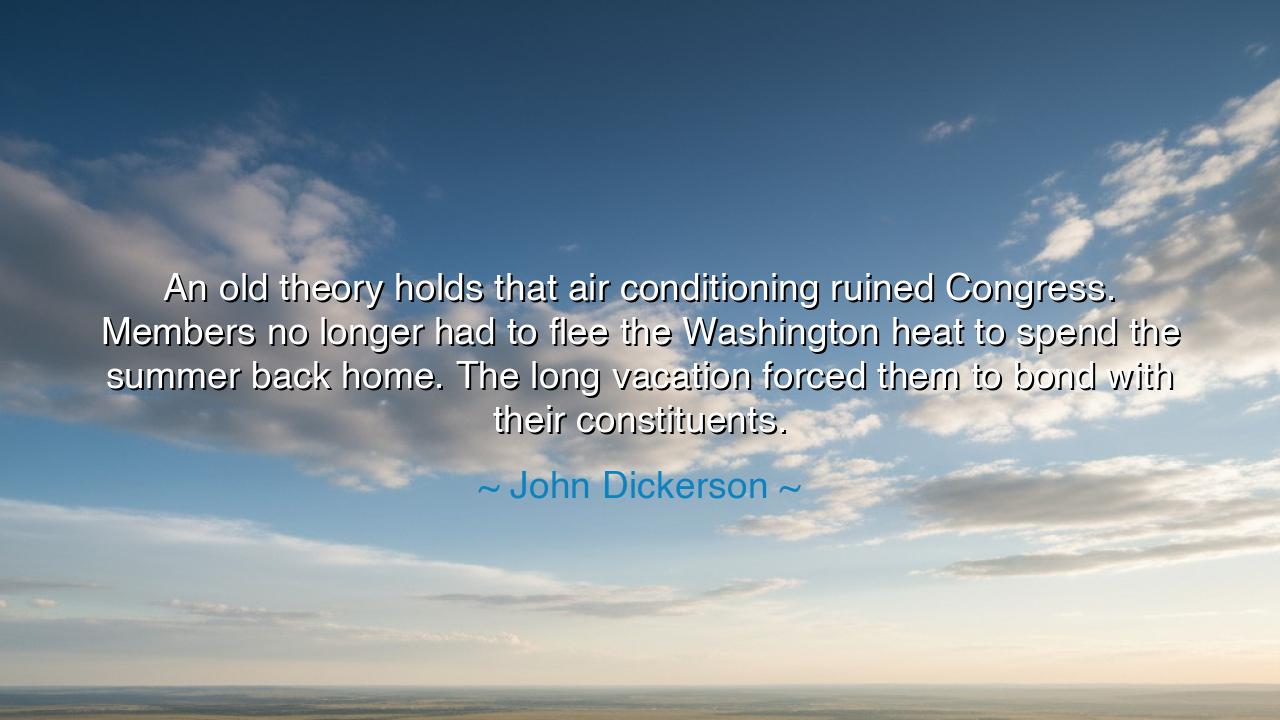
An old theory holds that air conditioning ruined Congress.
An old theory holds that air conditioning ruined Congress. Members no longer had to flee the Washington heat to spend the summer back home. The long vacation forced them to bond with their constituents.






In the chronicles of civic life, there is an old theory that speaks like a parable: that air conditioning ruined Congress. It is not a judgment on machines, but on men who forget the disciplines that once shaped their souls. Before the humming vents, the Washington heat was a stern tutor. It drove lawmakers from marble halls to dusty hometown streets, sent them back by rail and river to porches and feed stores, where they were known by first name and by fault. The furnace of summer pared pretension to the bone.
In that earlier rhythm, the long vacation was not idleness but pilgrimage. Representatives returned to the soil that grew them, to the churches that baptized them, to the mills that voted them into being. They learned again the measure of a handshake, the weight of a grocery bill, the sorrow of a shuttered barn. There, among their constituents, they were reminded that law is not parchment but bread, not oratory but roof and medicine and road. The heat made distance impossible; it pressed them homeward and demanded a bond renewed.
Then the vents were fitted, the rooms cooled, and the clock of the Capitol forgot to pant. Committees met when the cicadas sang. The city that should have been unlivable in August became agreeable, and the old migration faltered. The comfort that preserved the body dulled the senses that had once been kept bright by the ritual of return. This is the heart of John Dickerson’s observation: policy, like steel, is tempered by exposure; remove the forge, and the blade may shine, but it will not bite.
Consider a story, true in spirit if not in every ledger line. In the 1910s, before the cool air came, a Midwestern representative—let us call him Calhoun of the Prairie—left the Capitol each June when the bricks sweated and the Potomac stank of algae. He took the night train west and spent weeks walking county fairs. At one fair a widow pressed into his hand a ledger of debts her late husband had carried for seed and plow; at another, a war veteran asked why the school roof still leaked. Calhoun wrote their names in a small book, and when he returned in autumn, he carried those names like a catechism. The farm credit bill he helped craft was not abstract; it had the widow’s handwriting in its margin.
Years later, with air conditioning a hum behind every hearing, Calhoun’s successor rarely left in July. His letters were answered by staff, his meetings were with lobbyists who, like him, preferred the cool. He was decent, diligent, and distant. When a mill closed in his district, he learned of it from a memo, not from the calloused man who had bolted its doors for thirty years. It was not malice that separated him, but comfort. The temple had lost its pilgrimage.
The lesson is simple and stern: systems are shaped by seasons. What the Washington heat once enforced—humility, proximity, the necessary exodus—must now be chosen. If comfort keeps the body in place, duty must move the feet. A republic is a living covenant renewed not by indoor air but by outdoor witness: by town halls where breath mingles, by kitchen-table visits where coffee cools while the story warms, by office hours under the bleachers at a Friday-night game where the band drowns out pretense.
So let this be the charge to all who would govern, and to all who would keep them honest. First, schedule your own “ancient recess”: a fixed season of return, when you leave the marble and sit among the ordinary. Second, practice the rites of listening: carry a small book; fill it with names, not nouns. Third, accept disciplined discomfort: walk the factory floor at shift change; ride the bus at dawn; stand in the heat until the policy you propose has the taste of the air your people breathe. Fourth, measure yourself by your bond with your constituents, not by your comfort within the chamber. For machines can cool a room, but only pilgrimage can warm a polity.






AAdministratorAdministrator
Welcome, honored guests. Please leave a comment, we will respond soon